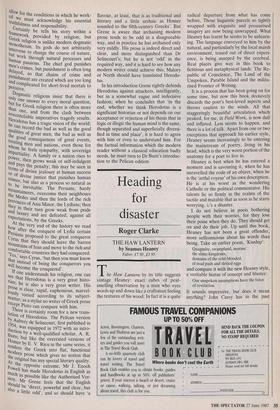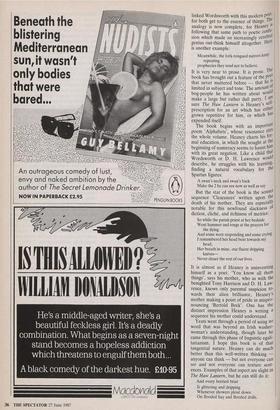Heading for disaster
Roger Clarke
THE HAW LANTERN by Seamus Heaney
Faber, f7.95, L3.95
The Haw Lantern by its title suggests vintage Heaney: exact cubes of peat- smelling observation by a man who eyes words up and down like a craftsman feeling the textures of his wood. In fact it is a quite radical departure from what has come before. Those linguistic parcels so tightly wrapped with exquisite and pressurised imagery are now being unwrapped. What Heaney has learnt he seems to be unlearn- ing. The language conveyed to him by the natural, and particularly by the local marsh environment, teased out of direct experi- ence, is being usurped by the cerebral. Real places give way in this book to fictitious and metaphysical lands: The Re- public of Conscience, The Land of the Unspoken, Parable Island and the milita- rised Frontier of Writing.
It is a process that has been going on for some time, but now this book decisively discards the poet's best-loved aspects and throws caution to the winds. All that staggeringly beautiful articulation which peaked, for me, in Field Work, is now dull and inflated. Less seems to happen, and there is a lot of talk. Apart from one or two exceptions that approach his earlier style, Heaney seems increasingly to be entering the mainstream of poetry, living in his head, which is the very worst portion of the anatomy for a poet to live in. Heaney is best when he has entered a moment and is savouring it, when he has unravelled the code of an object, when he is the 'artful voyeur' of his own description. He is at his worst as the wondering Catholic or the political commentator. His talents lie so firmly in the realms of the tactile and mutable that as soon as he starts worrying, it's a disaster. I do not believe in poets bothering people with their worries, for they lose their poise when they do. They should get on and do their job. Up until this book, Heaney has not been a great offender, more selfconscious about his words than being. Take an earlier poem, 'Kinship':
Quagmire, swampland, morass: the slime kingdoms, domains of the cold-blooded, of mud pads and dirtied eggs
and compare it with the new Heaney style, a veritable hiatus of concept and bluster:
Our unspoken assumptions have the force of revelation
It sounds impressive, but does it mean anything? John Carey has in the past linked Wordsworth with this modern poet, for both get to the essence of things. The analogy is now complete, for Heaney 15 following that same path to poetic confu- sion which made an increasingly cerebral genius out-think himself altogether. Here is another example:
Meanwhile, the fork-tongued natives keeP repeating
prophecies they tend not to believe. It is very near to prose. It is prose. The book has brought out a feature of the poet that never mattered before — that he is limited in subject and tone. The amount 131 bog-people he has written about would make a large but rather dull party. I aln,, sure The Haw Lantern is Heaney's sew prescription for an art which has either grown repetitive for him, or which has expended itself. The book begins with an important poem 'Alphabets', whose resonance stirs the whole volume. Heaney charts his for- mal education, in which the nought at the beginning of numeracy seems to haunt hull with its great negation. Like a child that Wordsworth or D. H. Lawrence would describe, he struggles with his learning, finding a natural vocabulary for the Spartan figures:
A swan's neck and swan's back Make the 2 he can see now as well as say
But the star of the book is the sonnet sequence 'Clearances' written upon the death of his mother. They are especially notable for this newfound slackness of diction, cliché, and itchiness of metrics:
So while the parish priest at her bedside Went hammer and tongs at the prayers for the dying
And some were responding and some crying I remembered her head bent towards my head, Her breath in mine, our fluent dripping knives—
Never closer the rest of our lives.
It is almost as if Heaney is uninventing himself as a poet. 'You know all them things', says his mother, who as with the benighted Tony Harrison and D. H. Law- rence, knows only parental suspicion to- wards their alien brilliance, HeaneY's mother making a point of pride in mispro- nouncing `Bertold Brek'. One has the distinct impression Heaney is writing a sequence his mother could understand. Yeats went through a period of using no word that was beyond an Irish washer- woman's understanding, though later he came through this phase of linguistic egali- tarianism. I hope this book is of that tangential nature. Heaney can do much better than this well-written thinking anyone can think — but not everyone can see and not everyone can texture sent- ences. Examples of that aspect are slight in The Haw Lantern, but he can still do it:
And every berried briar Is glittering and dripping Whenever showers plout down On flooded hay and flooded drills.










































































 Previous page
Previous page